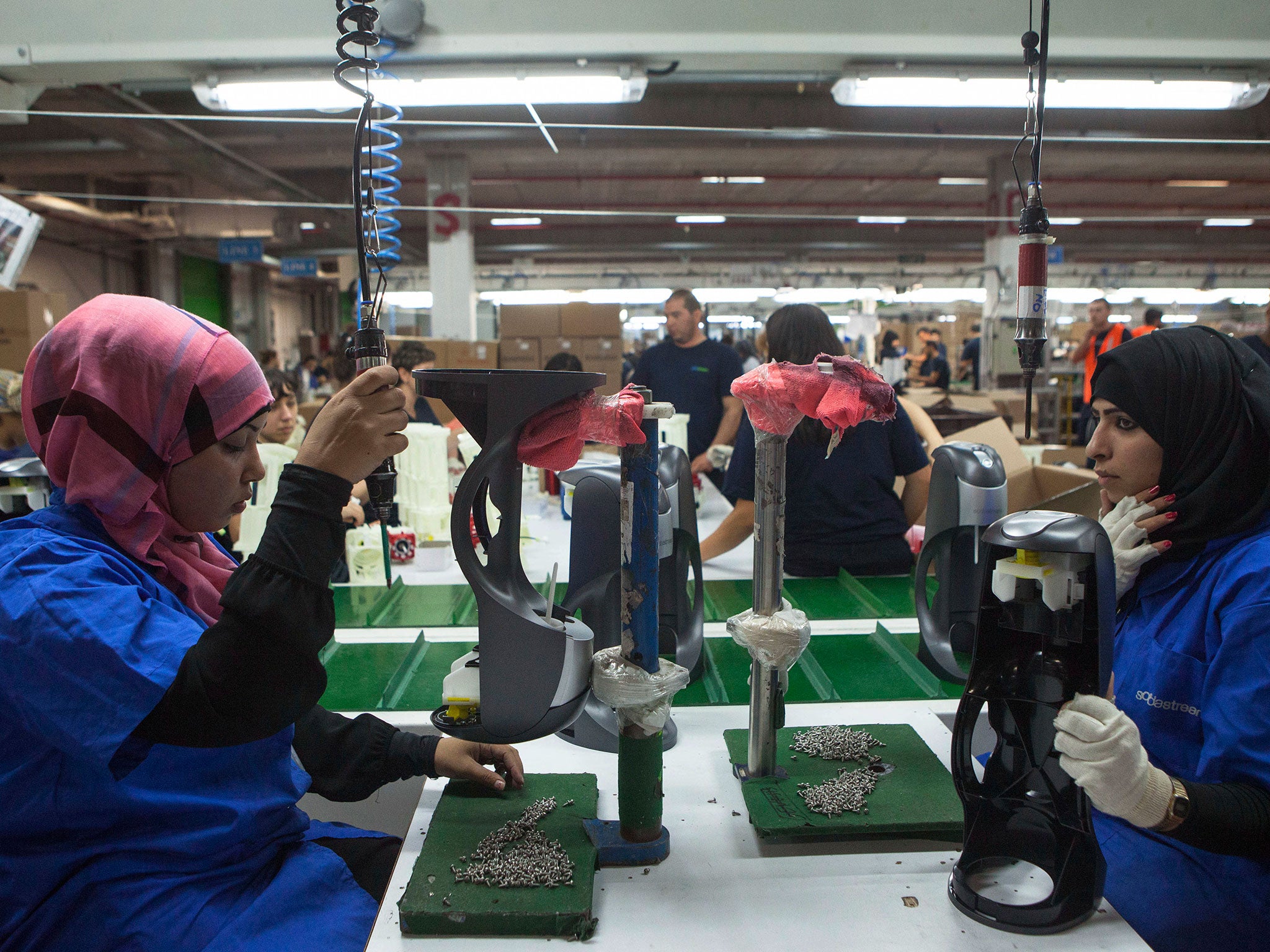SodaStream’s Palestinian employees pay price as Israel revokes work permits
Chief executive vows to challenge ‘immoral’ government decision amid BDS tensions

Your support helps us to tell the story
From reproductive rights to climate change to Big Tech, The Independent is on the ground when the story is developing. Whether it's investigating the financials of Elon Musk's pro-Trump PAC or producing our latest documentary, 'The A Word', which shines a light on the American women fighting for reproductive rights, we know how important it is to parse out the facts from the messaging.
At such a critical moment in US history, we need reporters on the ground. Your donation allows us to keep sending journalists to speak to both sides of the story.
The Independent is trusted by Americans across the entire political spectrum. And unlike many other quality news outlets, we choose not to lock Americans out of our reporting and analysis with paywalls. We believe quality journalism should be available to everyone, paid for by those who can afford it.
Your support makes all the difference.Nabil Bisharat began working at the fizzy-drinks machine manufacturer SodaStream six years ago.
It was, the 42-year-old recalled, a rare place of peaceful coexistence between Palestinians and Israelis.
Mr Bisharat, a father-of-seven, worked his way up from assembly worker to shift manager to line manager and, three years ago, to manager of the head-valves department.
Together with 73 other Palestinian workers at the Israeli firm, he has now been denied government permission to keep working in Israel, sending them from a position of financial stability to uncertainty in the depressed economy of the West Bank.
“It’s a shock,” Mr Bisharat told The Independent over coffee at a cafe in al-Bireh, close to his home in the village of Jaba. “Until the last moment I didn’t believe they would fire us.”
He had 53 people working under him at SodaStream, about half of them Israeli Jews. Now he may have to go back to working as a baker.
“It’s like a big family, with a lot of friendships, said Mr Bisharat. “I’m not a politician, I’m a simple man but that’s the reality. Both Arabs and Jews reached the point of not rejecting the other and wanting to live in the same land in peace. They share our celebrations, our sorrows, everything. When someone feels sorry we share it; it’s sharing feelings, not only work.”
His colleagues organised goodbye breakfasts and lunches for the departing Palestinians and a colleague treated a group of them to a day out at the marina in the southern Israeli city of Ashkelon. On Monday, before the Palestinians got on the bus back to the West Bank for the last time, hundreds of workers formed a huge peace sign outside the plant.
Asked why the permits were denied, the Israeli Prime Minister’s office replied that “the policy of the government is to give priority to the employment of Israeli workers”.
But with plans already approved by Israel’s security cabinet to give work permits to an additional 30,000 Palestinians from the West Bank in addition to the 58,000 who already have them and an estimated 30,000 who work illegally, it is puzzling to many that the 74 could not be accommodated.
The SodaStream chief executive, Daniel Birnbaum, says the rationale for denying permits are “excuses”.
“It’s ridiculous,” he said. “There is no way 74 people will change anything in the dynamics of the Israeli economy.”
The SodaStream workers are, he said, victims of Israel’s attempt to discredit the Boycott, Divestment and Sanctions (BDS) movement, which calls for boycotts against Israel over its occupation of the West Bank.
In late 2014 SodaStream closed its plant at the West Bank settlement industrial zone of Mishor Adumim and moved to its current facility at Lehavim in southern Israel following a BDS campaign that included targeting Hollywood actress Scarlett Johansson who advertised SodaStream products. More than 500 Palestinian workers – mostly people ineligible for permits to enter Israel – lost their jobs, while 74 workers were given temporary permits and moved with the company to Lehavim.
The Israeli government makes its case against boycotts by stressing that those who pay the price for plant closures are the Palestinian workers who lose their jobs.
“Apparently my 74 employees are being sacrificed to make a claim that BDS is hurting the Palestinians,” Mr Birnbaum said. “But I don’t believe in human sacrifice. I will not allow this immoral act to go unchallenged. You don’t throw people into the street to make a political point.”
He still hopes that the government will reverse its decision but says that in any case, he will “figure something out” to provide work for the 74 Palestinians within the West Bank.
Mr Bisharat said his SodaStream salary was enough to support his family, build a house and buy two pieces of land. His 16-year-old son is studying carpentry and he had hoped to build a factory for him.
“I thought my entire career would be with SodaStream. It was my plan to stay for another 10 years. I could have got more promotions.”
Of the 74 individuals laid off last week most are managers, shift managers and line managers, Mr Bisharat said.
“It’s difficult for them to start as simple workers again. It’s very difficult.”
Join our commenting forum
Join thought-provoking conversations, follow other Independent readers and see their replies
Comments